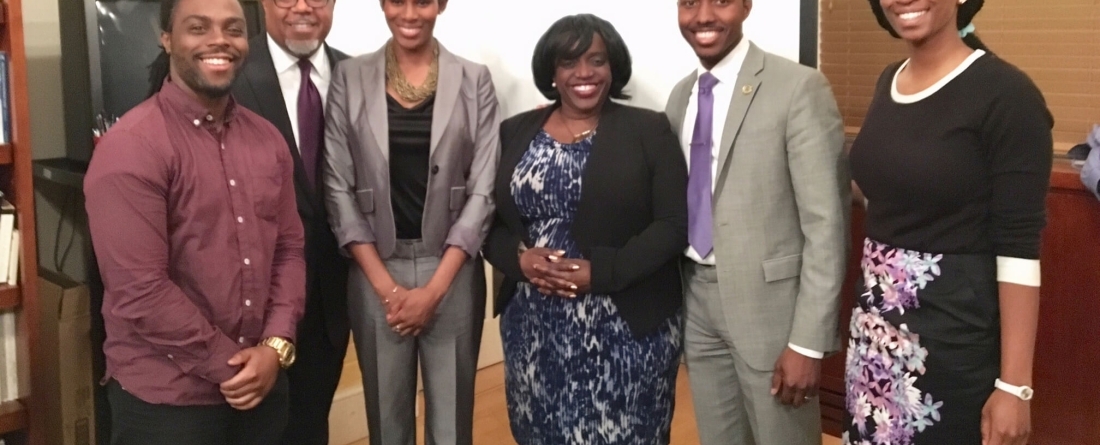
Last month, the Black Students in Public Policy organization hosted a career panel at the University of Maryland School of Public Policy to bring black policy professionals to campus to engage with students.
The panelists came from a variety of policy backgrounds and sectors, including Krystle Norman, United States diplomat and MPP alumna; Mike Lyles, executive director for the Prince George’s County Human Relations Commission and chair of the Anti-Human Trafficking Committee of the National Bar Association; Jazz Lewis, Maryland State Delegate and MPP alumnus; and Walakewon Blegay, DC Nurses Association lawyer with extensive political campaign management experience.
“Hosting career panels was always something we knew we would do as BSiPP because we wanted students across SPP to be reminded that there are people who look like us making a difference in policy,” said MPP student Corinne Paul, who had the original idea to host the panel. “For attendees, it’s invaluable to get encouragement and advice from those who have had career paths similar to the ones we are considering taking ourselves. In particular, black policy students getting advice from black policy professionals means that that knowledge will be tailored to our individual experiences and some of the unique challenges and responsibilities we have as a minority in this field.”
“We wanted to provide more than just a social setting for students to get to know each other,” added MPP student Theo Caruthers. “Ideally, we were hoping that the students saw their future selves in the panelists. Students who are able to attach a face and name to a dream they have makes it much more tangible.”
“A major theme of the panel was that unless there are people like us in these decision-making spaces, there will be portions of the population whose voices won’t be heard and whose perspectives won’t be taken into consideration, even when those decisions directly affect them,” Paul added.
Hosting career panels was always something we knew we would do as BSiPP because we wanted students across SPP to be reminded that there are people who look like us making a difference in policy.Corinne Paul SPP Student
Career panels can help students get advice on certain career paths, as well as stimulate thought about new career paths that they were unaware of. “Our panel had two MPPs and two lawyers, so we were able to talk about working in public policy in a way that was unique to other career panels,” Paul said. “Undergraduate policy majors were able to get advice on whether they should pursue law degrees or policy degrees, and all students were given perspectives on how their policy studies could be applied locally, internationally, in campaigns and in courtrooms.”
Caruthers said events like the career panel demonstrate what’s possible for students of color. “It’s great to have a group of students dedicated to black advancement in policy. We have a diverse set of students in the School of Public Policy and BSiPP is proud to be able to cater to a unique set of students. It definitely serves as a confidence booster,” he said. “Knowing that there are black students who graduated from SPP and are doing relevant and exciting policy work is inspiring and necessary. Not only is there a group dedicated to black student’s social success, but also their professional development. That’s invaluable.”
“Groups like Black Students in Public Policy and other identity-based organizations are essential,” Paul said. “I wanted to create BSiPP because so many of us felt isolated or out of place when we were consistently the only person of color in many of our classes. By creating an official student organization, we let the school and (most importantly) each other know that we are here. BSiPP provides a supportive community for current students in addition to being an avenue for connections to alumni who wished there was a group like this during their time at SPP. People of color are disproportionately affected by several public policy decisions, so having a group that can focus on these issues in a real way at the school is vital for making us all better policy makers.”
“Tolerance and inclusion are good words to have floating around a program, but events like this show commitment,” Caruthers said. “The best part of this event, in my opinion, wasn’t the fact that it happened and went well. The best part was knowing that on-campus departments supported us. Career Services agreed to help out, publicize and sponsor the event and the External Relations office showed amazing support for another BSiPP event held earlier this semester. That recognition of hard work is extremely lifting for a current student.”
As a graduating student, Paul says she’s excited to have started BSiPP for future policy students. “BSiPP has had a busy and exciting year! Since this was the first academic year we existed, we really wanted to make our presence known in SPP,” she said. “We’ve held several general body meetings for students to get to know each others, hosted happy hours that connected current students with alumni, began a monthly newsletter to highlight members of our community and now this career panel. I graduate this spring, but I couldn’t be more excited to see what the future holds for BSiPP.”
